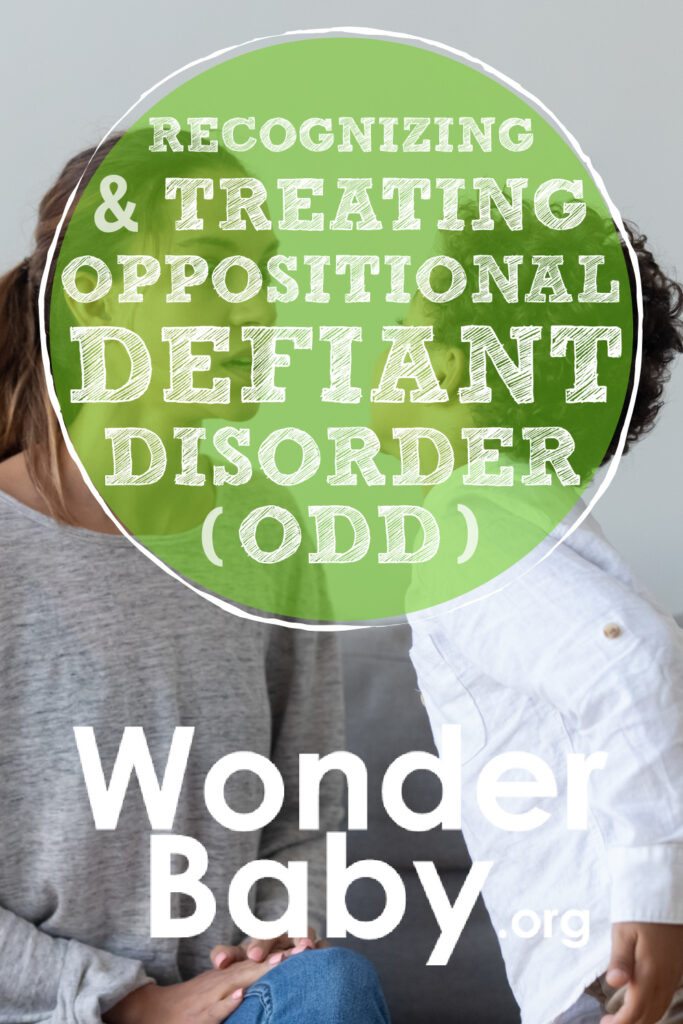Recognizing and Treating Oppositional Defiant Disorder (ODD)

- Almost all children will exhibit defiant, uncooperative, or oppositional behavior from time to time as a part of their typical development.
- Challenging and hostile behavior is identified as oppositional defiant disorder when it becomes a long-lasting pattern of difficult behavior that negatively affects a child’s daily functioning and relationships with their family and peers.
- Early intervention in treating oppositional defiant disorder is essential to help a child manage their behavior and reduce their risk of developing conduct disorder later on.
- Treatment for ODD requires the consistent involvement of parents and caregivers to help manage their child’s behavior.
Ignoring instructions, breaking the rules, refusing to do what is asked, intentionally annoying others—these are all challenging behaviors that kids will demonstrate as a part of their typical development, especially in the toddler years and again in early adolescence.
However, when oppositional, aggressive, and argumentative behavior happens frequently and consistently and starts to affect your child’s daily life at school, with peers, and at home, it may be a sign of oppositional defiant disorder (ODD).
Recognizing and treating oppositional defiant disorder may be a challenging journey for you and your child, but with intervention and consistency, you can improve your child’s—and your whole family’s—quality of life.
What Is Oppositional Defiant Disorder?

Oppositional Defiant Disorder (ODD) is defined by the American Academy of Child and Adolescent Psychiatry11. Aacap. Oppositional Defiant Disorder Resource Center. The American Academy of Child and Adolescent Psychiatry. 2019. https://www.aacap.org/AACAP/Families_and_Youth/Resource_Centers/Oppositional_Defiant_Disorder_Resource_Center/Home.aspx (AACAP) as an ongoing pattern of hostile, uncooperative, and defiant behaviors toward authority figures, like parents and teachers.
Although all toddlers, children, and adolescents may display defiant or noncompliant behaviors occasionally, for a child with ODD, the frequency and intensity of these disruptive behaviors interferes with their daily functioning and relationships.
Oppositional behaviors are a normal part of development for two to three-year-olds who may show aggression or have frequent meltdowns. Young teenagers may also exhibit problematic behaviors as they test boundaries and rules.
However, according to the AACAP, a child’s defiant behavior should concern parents when:
- It’s frequent.
- It’s consistent.
- It affects the child’s family, academic, and social life.
- It stands out when compared to the behavior of children of a similar age and developmental level.
What Are Examples of Oppositional Behavior?
Open hostility to authority and uncooperative behaviors can take many forms, and every child is different. Additude Magazine22. ADDitude Editors. The ADHD and ODD Link in Children. ADDitude. 2020. https://www.additudemag.com/oppositional-defiant-disorder, a resource for families dealing with ADD, ADHD, and related disorders, sites these as common ODD symptoms and behaviors:
- Chronic aggression
- Frequent outbursts
- A tendency to argue
- A tendency to ignore requests
- A tendency to engage in intentionally annoying behavior
What Causes Oppositional Defiant Disorder?

According to the AACAP, the causes of oppositional defiant disorder often combine biological, psychological, social, and environmental factors.
Risk factors for the development of ODD include:
- A family history of attention deficit hyperactivity disorder (ADHD), mood disorders such as depression or bipolar disorder, anxiety disorders, or substance use disorder.
- Lack of structure or parental supervision.
- Inconsistent discipline.
- Exposure to abuse or community violence.
Researchers have shown that children with ODD may have subtle differences33. Noordermeer, S. D., Luman, M., & Oosterlaan, J.. A Systematic Review and Meta-analysis of Neuroimaging in Oppositional Defiant Disorder (ODD) and Conduct Disorder (CD) Taking Attention-Deficit Hyperactivity Disorder (ADHD) Into Account. Neuropsychology Review. 2016;26(1), 44–72. https://doi.org/10.1007/s11065-015-9315-8 in the physiology of the parts of their brains that control impulsive behavior.
Psychological studies44. Hamilton, S. S., & Armando, J.. Oppositional defiant disorder. American Family Physician. 2008;78(7), 861–866. https://pubmed.ncbi.nlm.nih.gov/18841736 have also shown that children who exhibit hostile behavior have difficulty understanding social cues and problem-solving. They may expect to be rewarded for aggressive behavior.
What Mental Health Conditions Are Associated with Oppositional Defiant Disorder?
Many children with ODD also have other mental health conditions55. Cleveland Clinic Medical Professional. Oppositional Defiant Disorder (ODD). Cleveland Clinic. 2022. https://my.clevelandclinic.org/health/diseases/9905-oppositional-defiant-disorder, such as ADHD, anxiety disorder, mood disorders, impulse control disorders, and learning differences.
Conduct disorder and ADHD are often closely associated with ODD.
What is Conduct Disorder?
According to the AACAP, about 30% of children diagnosed with oppositional defiant disorder go on to develop conduct disorder.
Conduct disorder66. Behavior or Conduct Problems in Children. Centers for Disease Control and Prevention. 2023. https://www.cdc.gov/childrensmentalhealth/behavior.html is an ongoing pattern of aggression and serious violations of rules at home, school and with peers, which can even involve breaking the law or sustaining injuries.
Examples of behaviors common to conduct disorder include:
- Running away
- Not attending school
- Aggression toward peers, such as bullying or fighting
- Cruelty to animals
- Lying, stealing, or deliberately damaging property
What is Attention Deficit Hyperactivity Disorder (ADHD)?
Studies show that up to 40% of children77. Riley, M., Ahmed, S., & Locke, A.. What Are Common Comorbidities with ODD?. American Family Physician. 2016. https://www.aafp.org/pubs/afp/issues/2016/0401/p586.html#what-are-common-comorbidities-with-odd- with oppositional defiant disorder also have ADHD. Although these disorders often exist together, they are distinct.
ODD refers to a child’s disruptive and aggressive behaviors that affect their relationships and interactions.
ADHD is a neurodevelopmental disorder that causes difficulty with executive functioning skills like focus and organization and is often characterized by excessively restless behavior.
While many children with ODD also have ADHD, the reverse is not the case: most children with ADHD do not develop ODD.
How Is Oppositional Defiant Disorder Diagnosed?

A child psychiatrist or qualified mental health expert can diagnose oppositional defiant disorder.
The diagnosis of ODD is given if four of the eight criteria listed in the Diagnostic and Statistical Manual of Mental Disorders (DSM-V)88. Diagnostic and Statistical Manual of Mental Disorders (DSM-5-TR). Psychiatry.org. https://www.psychiatry.org/psychiatrists/practice/dsm are present for at least six months.
These criteria for ODD99. DSM-5 Changes: Implications for Child Serious Emotional Disturbance [Internet]. National Center for Biotechnology Information. 2016. https://www.ncbi.nlm.nih.gov/books/NBK519712/table/ch3.t14 include:
- Often loses temper
- Is often touchy or easily annoyed
- Is often angry and resentful
- Often argues with authority figures or, for children and adolescents, with adults
- Often actively defies or refuses to comply with requests from authority figures or with rules
- Often deliberately annoys others
- Often blames others for their mistakes or misbehavior
- Has been spiteful or vindictive at least twice in the past 6 months
The oppositional defiant disorder symptoms must also negatively affect the child’s daily functioning at home, school, or socially with peers to obtain a diagnosis.
What Are the Treatments for Oppositional Defiant Disorder?

Early treatment of oppositional defiant disorder is important for reducing the child’s risk of developing conduct disorder or a longer-lasting personality disorder in adulthood.
An effective treatment plan for ODD will be individualized and specific to the needs of the child and family. It will often include individual and family therapy and working with the child’s school.
Positive reinforcement and frequent feedback for your child’s praiseworthy behaviors are essential to any ODD treatment program.
Parent Management Training
Parent management training1010. Arky, B.. Choosing a Parent Training Program. Child Mind Institute. 2023. https://childmind.org/article/choosing-a-parent-training-program (PMT) is an important component of ODD treatment. PMT equips parents with discipline and supervision techniques to help manage tantrums, disruptive behavior, and aggression.
Parents may be seen alone, without the child present, to model and role-play techniques with a therapist. The goal of PMT is to examine parenting style and change how parents and caregivers react to the child’s behavior, helping them respond to challenging behaviors and improve their relationship.
Positive parenting techniques are a critical component of parent management training programs. Positive reinforcement of your child’s desirable behaviors is key. Modeling positive behaviors and providing positive feedback are essential for children with ODD.
The parent-child relationship is often negatively impacted when frequent behavioral and discipline issues arise which strain the bond between child and parent. Social emotional activities that strengthen the parent-child bond are also important for repairing family relationships that may have fractured.
Enthusiasm, consistency, positive non-verbal and verbal cues, and learning how to handle tantrums and meltdowns are all part of PMT that will help you and your child deal with challenging behavioral issues more effectively.
Individual and Family Talk Therapy
Depending on your child’s age, individual psychotherapy, where your child would talk individually with a mental health provider, can be useful. Helping your child identify and express their emotions and learn to manage their feelings of anger can help with their behavior problems. It can also help them work on problem-solving skills.
Family therapy, in which the child’s entire family engages with a qualified mental health professional, can help with communication in the home and may identify dynamics that escalate behavioral problems.
Frequent temper tantrums, defiance of rules, and other negative interactions between children and parents can hurt parent and sibling relationships. Family therapy can assist in repairing relationships among family members.
School-based Intervention
For school-age children, working closely with your child’s teachers and school to help identify problem behaviors and decrease unwanted behaviors is an essential part of an effective ODD treatment strategy.
Peer rejection at school because of challenging or disruptive behavior can contribute to your child’s ODD and exacerbate difficult behavior patterns. Working with your child’s school on behavior management techniques and equipping staff with resources to assist with rule-following and reinforcing positive behaviors are a useful addition to any treatment plan.
Medication
Medication can be part of a treatment plan for ODD, especially if other issues like ADHD or anxiety are present. However, medication alone can’t be relied upon as a treatment, and no single medication can prevent ODD symptoms.
Medication used in combination with other therapies can be an effective part of the treatment for ODD. However, any decision about medication should be undertaken with your child’s healthcare provider.

FAQs
Can ODD be outgrown, or does it require ongoing management throughout adulthood?
AACAP reports1111. Aacap. Frequently Asked Questions. The American Academy of Child and Adolescent Psychiatry. https://www.aacap.org/AACAP/Families_and_Youth/Resource_Centers/Oppositional_Defiant_Disorder_Resource_Center/FAQ.aspx#ODDFAQ1 that ODD is typically outgrown, with symptoms resolving in approximately three years, in about 67% of children. Parents and caregivers can navigate and manage those years more effectively with intervention and treatment.
However, about 30% of children go on to develop conduct disorder later on, with about 10% developing a personality disorder in adulthood, like antisocial personality disorder. The risk of developing these disorders is higher in children who have been diagnosed at preschool age.
Can I do something to prevent my child from having ODD?
There is no one direct cause of ODD. It is a combination of a number of biological, social, and psychological factors and will be different for every child.
Preventing ODD entirely may not be possible, but you can reduce the factors in the environment that worsen your child’s symptoms.
With early treatment, and parent, individual, and family therapy, you can help your child to manage their behavior better and improve your parent-child relationship.
Positive reinforcement, consistent supervision and discipline with clear expectations, parent management training, and working together with your child’s school can all help a child with ODD.
A good starting point is assessment from a qualified mental health professional who can tailor an individualized program of support for your child.
There is also evidence that programs like Head Start for young children, and programs in school geared toward social skill development and reducing anti-social behavior for older children can be helpful in addressing ODD.
References
- Aacap. (2019). Oppositional Defiant Disorder Resource Center. The American Academy of Child and Adolescent Psychiatry. https://www.aacap.org/AACAP/Families_and_Youth/Resource_Centers/Oppositional_Defiant_Disorder_Resource_Center/Home.aspx
- ADDitude Editors. (2020, October 9). The ADHD and ODD Link in Children. ADDitude. https://www.additudemag.com/oppositional-defiant-disorder
- Noordermeer, S. D., Luman, M., & Oosterlaan, J. (2016). A Systematic Review and Meta-analysis of Neuroimaging in Oppositional Defiant Disorder (ODD) and Conduct Disorder (CD) Taking Attention-Deficit Hyperactivity Disorder (ADHD) Into Account. Neuropsychology Review, 26(1), 44–72. https://doi.org/10.1007/s11065-015-9315-8
- Hamilton, S. S., & Armando, J. (2008). Oppositional defiant disorder. American Family Physician, 78(7), 861–866. https://pubmed.ncbi.nlm.nih.gov/18841736
- Cleveland Clinic Medical Professional. (2022, May 16). Oppositional Defiant Disorder (ODD). Cleveland Clinic. https://my.clevelandclinic.org/health/diseases/9905-oppositional-defiant-disorder
- Behavior or Conduct Problems in Children. Centers for Disease Control and Prevention. (2023, July 26). https://www.cdc.gov/childrensmentalhealth/behavior.html
- Riley, M., Ahmed, S., & Locke, A. (2016, April 1). What Are Common Comorbidities with ODD? American Family Physician. https://www.aafp.org/pubs/afp/issues/2016/0401/p586.html#what-are-common-comorbidities-with-odd-
- Diagnostic and Statistical Manual of Mental Disorders (DSM-5-TR). Psychiatry.org. (n.d.). https://www.psychiatry.org/psychiatrists/practice/dsm
- DSM-5 Changes: Implications for Child Serious Emotional Disturbance [Internet]. National Center for Biotechnology Information. (2016, June). https://www.ncbi.nlm.nih.gov/books/NBK519712/table/ch3.t14
- Arky, B. (2023, February 8). Choosing a Parent Training Program. Child Mind Institute. https://childmind.org/article/choosing-a-parent-training-program
- Aacap. (n.d.). Frequently Asked Questions. The American Academy of Child and Adolescent Psychiatry. https://www.aacap.org/AACAP/Families_and_Youth/Resource_Centers/Oppositional_Defiant_Disorder_Resource_Center/FAQ.aspx#ODDFAQ1

Related Posts

Behavior
Understanding Intermittent Explosive Disorder in Children
Are you worried about your child’s unexpected aggression and explosive behaviors? Learn how to support a child with intermittent explosive disorder.

Behavior
5 Emotional Regulation Activities for Kids
Want to teach your child how to regulate emotions? Here are emotional regulation activities for kids that can help!

Behavior, Special Needs
5 Tips for Dining Out with Children Who Have Sensory Sensitivities
Worried about dining out with sensory sensitivities? Try these tips for less stress and more fun the next time you take your family out to eat.